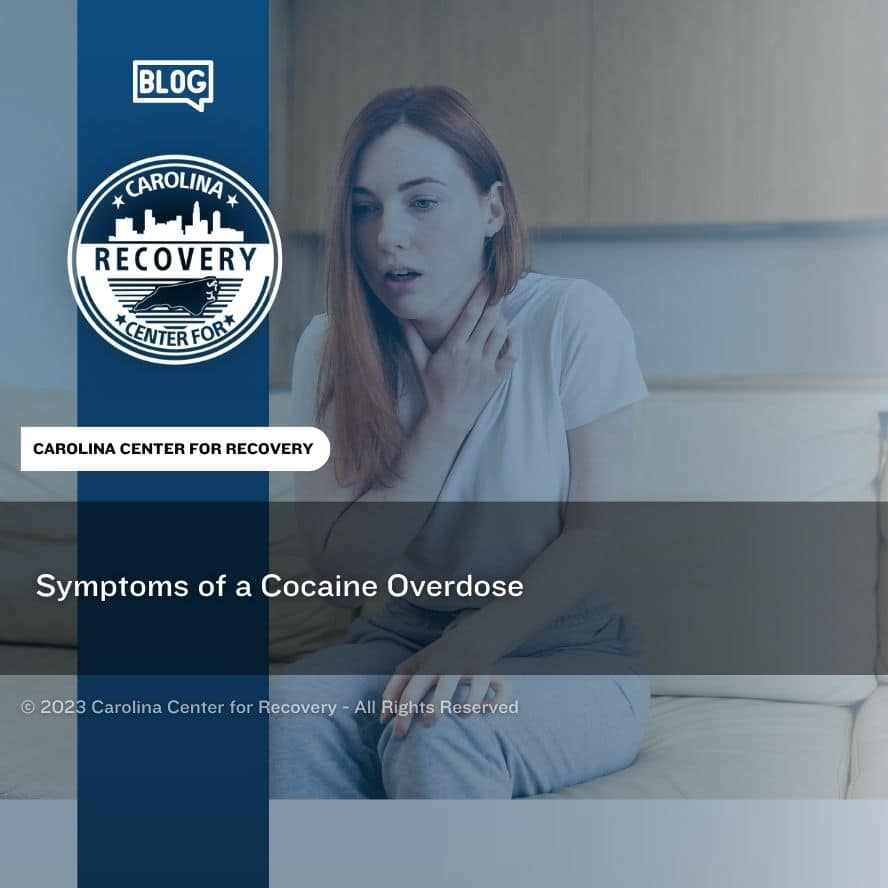Symptoms of a Cocaine Overdose

Medically Verified: 2/1/24
Medical Reviewer
Chief Editor

All of the information on this page has been reviewed and verified by a certified addiction professional.
Cocaine is a highly addictive, illicit drug. Users may take cocaine for its stimulant effects. However, using cocaine has many short and long-term risks.
One of the most significant risks of using cocaine is overdose. A cocaine overdose is a life-threatening medical emergency.
This article will explore the risks of cocaine use. You will learn the signs of a cocaine overdose and what to do. You will also learn how to recognize cocaine addiction and find treatment to overcome it.
Contact the Carolina Center for Recovery team to learn about our addiction treatment programs. We can answer your questions, verify your insurance, and schedule an intake appointment. Contact us now to start your recovery journey.
Cocaine: Effects and Risks
Cocaine is a powerful stimulant drug. People make cocaine using an extract from South American coca leaves.
Cocaine increases central nervous system (CNS) activity. People experience short-term side effects, including:
- Increased energy levels
- Elevated heart rate and blood pressure
- Increased alertness
- Euphoria
- Heightened senses
People who use large doses of cocaine may experience unwanted side effects, including:
- Irritability
- Agitation
- Anxiety
- Restlessness
- Panic attacks
- Psychosis
- Violent behaviors
- Muscle twitches
Frequent use may lead to physical dependence. Over time, cocaine abuse can damage your physical and mental health. It can increase your risk of heart attack, malnutrition, kidney disease, and other life-threatening complications.
Cocaine users may also experience a fatal overdose. People who take large doses of cocaine are at increased risk for an overdose.
Cocaine Overdose Symptoms
Research from 2021 shows that nearly 24,500 people in the United States suffered cocaine-related deaths in the previous year. Research also shows that more cocaine users are losing their lives to this dangerous drug than in previous years.
A cocaine overdose can be fatal. While some factors may increase the risk of overdose, anyone using this potent drug is at risk. Knowing the signs and getting help is critical.
Some symptoms of cocaine overdose include:
- Paranoia
- Panic
- Restlessness
- Agitation
- Aggression
- Elevated body temperature
- Chest pain
- Confusion
- Fast breathing
- Changes in heart rhythm
- Stomach pain
- Nausea
- Vomiting
- Seizures
- Twitching
If you or someone else is showing signs of a cocaine overdose, you must act quickly. Call 911 right away. Stay with the person until emergency services arrive.
Tell the emergency responders what drugs the person has been using. If you know the amount of cocaine the person used, share this information.
You will never get in trouble for telling a medical professional about substance use. This information can help them provide the best life-saving care possible. Many states, including North Carolina, have Good Samaritan Laws that prohibit law enforcement officers from prosecuting individuals who witness an overdose and attempt to seek help for the victim.
Preventing Cocaine Overdose
There are several steps you can take to reduce the risk of overdose. These include:
- Avoid mixing cocaine with other drugs or alcohol
- Always use clean needles–don’t share with others
- Never use cocaine alone
- Avoid using large amounts of cocaine
Cocaine is often tainted with other drugs, including lethal doses of fentanyl. It is nearly impossible to determine the quality or safety of cocaine. All cocaine users are at risk of overdose. The only reliable way to prevent cocaine overdose death is to stop using cocaine.
Cocaine addiction is a complex condition. If you develop a physical dependence on cocaine, it may be very challenging to quit using it when you choose. Most people who struggle with cocaine abuse and addiction need professional treatment and ongoing support to avoid relapse.
Treatment for Cocaine Addiction
The only way to eliminate the risk of cocaine addiction is to recognize it and seek treatment. Some signs of cocaine addiction include:
- Spending a lot of time and energy getting, using, and recovering from using cocaine
- Needing to use more cocaine to get the effects you want
- Doing dangerous things while using cocaine, such as driving or having risky sex
- Having physical symptoms of cocaine use, like frequent nosebleeds and losing lots of weight
- Doing illegal things to get cocaine
- Having financial, social, or legal trouble related to your substance use
- Experiencing withdrawal symptoms if you stop using cocaine
- Feeling like you want to stop using cocaine but finding that it’s impossible
Cocaine addiction rehab programs provide evidence-based and holistic treatments to help you safely stop using cocaine and avoid relapse. Your treatment plan may include:
- Medically-supported detox
- Individual counseling and behavioral therapies
- Group therapy
- Family therapy
- Relapse prevention education
- Holistic therapies like yoga, nutrition support, mindfulness, massage, and more
- Medications
- Mental health and medical care
- Aftercare planning
Addiction treatment is not a one-size-fits-all process. There are several levels of addiction treatment programs offered in a variety of settings to meet a wide range of needs during recovery.
Find Help Now
If you or someone you love are struggling with cocaine addiction, you are not alone. Effective, holistic treatment is available at the Carolina Center for Recovery.
Contact our admissions specialists now to learn about our programs and schedule an intake. Don’t wait another day to get help. Contact us today to begin your recovery journey.

